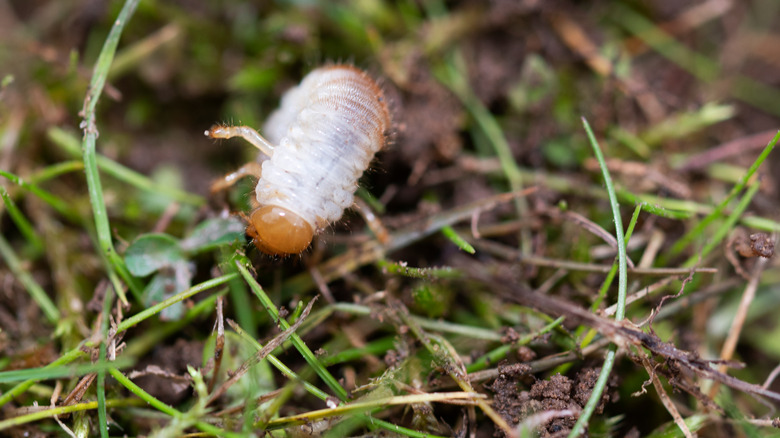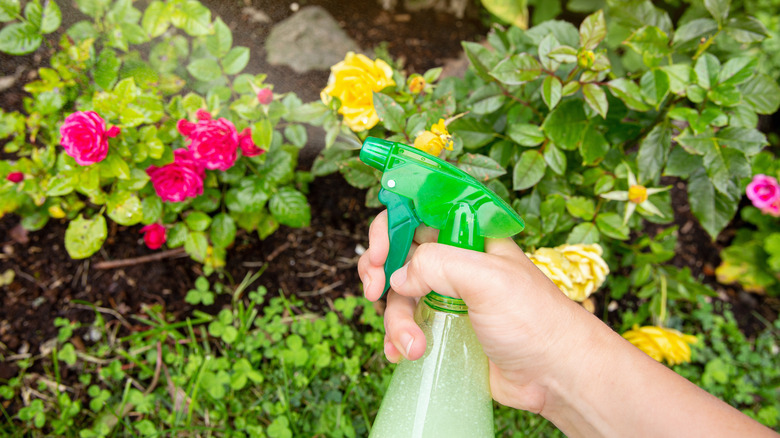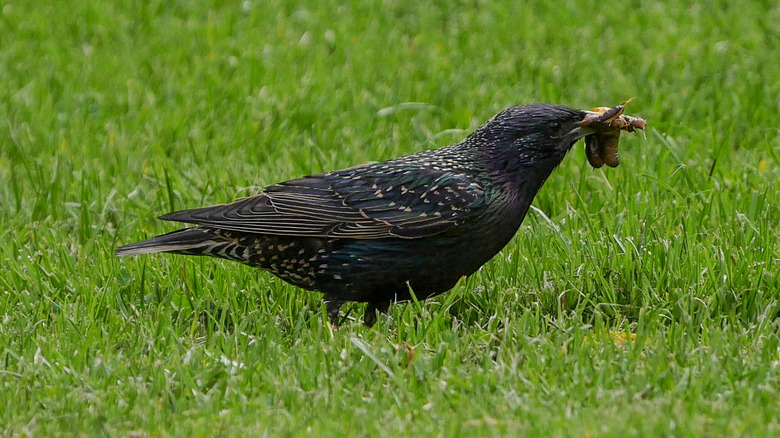Why You Should Think Twice Before Using Dish Soap To Get Rid Of Lawn Grubs
You may have heard about the DIY solution of using dish soap on your lawn and garden as a way to get rid of pests. While this method may work sometimes, it isn't always effective for grubs and can damage the plants you place it on, defeating its benefits. Grubs are present because there's a food source there, including the roots of grass. These insects can cause brown patches in your lawn, which is why many want to remove them. However, while using products like dish soap could seem to be an effective way to kill them, this can have significant limitations and drawbacks.
In fact, dish soap is just a deterrent, meaning that it's less likely to have any effect on the grubs already in your garden. While it will ward off new grubs from coming into your yard, it's not as likely to work as an effective way to kill them or remove them immediately from the space, which means the damage to your plants could continue for some time. If you plan to use this method, it's critical to understand how it works and the limitations present. What's the bottom line, then? While some may encourage the use of dish soap as a way to get rid of grubs, it's not likely to be worth the work. Other solutions may be both safer and more effective.
The risks of using dish soap in the garden to get rid of grubs
In the past, people would dispose of dirty dishwater in the garden, believing the soap and organic materials present in it would help support the plants and get rid of pests like grubs. Decades ago, this may have worked since the soap could stop pests from breathing, but the problem rests in what you're using. Today's dish detergents, those that were once commonly recommended for use on the lawn and garden, don't contain the same types of soap and instead contain detergents that are actually harmful to plants. They also only work as a deterrent, not a treatment for grubs, meaning that they won't kill them.
When you spray dish detergent-type products onto the surface of plants, you may be doing more harm than good. The detergent can wash away the natural oils and protective coverings on the surface of the leaves, which work to help protect them from damage. After spraying, you may notice the leaves becoming discolored and damaged, which may be due to leaf burn. However, not all plants will have this type of reaction. If you want to use dish soap, first test it on a few leaves of each of the plants in your garden to determine if there's a negative impact. It's also important to note that these chemicals can last in the soil since they're not fully biodegradable, which could continue to harm your vegetation.
Better solutions for getting rid of grubs in your lawn
If you're looking for a natural and safe way to get rid of grubs, there are a few alternative options that can work very well. Consider the use of an insecticidal soap, which is an organic product designed specifically to keep pests away from plants. It's actually designed to protect plants while treating grubs and other insects. Though more expensive and with some limitations on what it can treat, these products can be an effective solution. Be sure to know exactly what they treat and if they're safe for your plants.
Also consider releasing beneficial nematodes into your lawn. These are worms that aren't interested in your plants but rather the grubs present in your soil. They are microscopic organisms best applied during the spring months that work to keep problem grubs and pests, including ticks, under control. Another solution is the use of milky spore, a type of powder that's safe for plants and added to the soil to help get rid of the grubs that turn into Japanese Beetles.
You could invite some winged friends to your yard for help with controlling pests and grubs, too. Attract birds to the yard with a bird feeder or birdhouse, or take things one step further by raising backyard chickens. If they are free-range chickens, they'll help control most of the grubs in your lawn.


